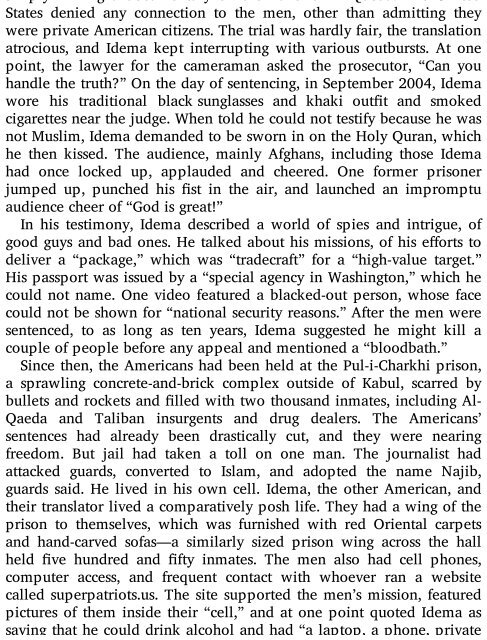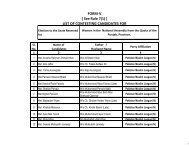the_taliban_shuffle_-_kim_barker
the_taliban_shuffle_-_kim_barker
the_taliban_shuffle_-_kim_barker
Create successful ePaper yourself
Turn your PDF publications into a flip-book with our unique Google optimized e-Paper software.
simply lming a documentary on <strong>the</strong> hunt for Al-Qaeda. The United<br />
States denied any connection to <strong>the</strong> men, o<strong>the</strong>r than admitting <strong>the</strong>y<br />
were private American citizens. The trial was hardly fair, <strong>the</strong> translation<br />
atrocious, and Idema kept interrupting with various outbursts. At one<br />
point, <strong>the</strong> lawyer for <strong>the</strong> cameraman asked <strong>the</strong> prosecutor, “Can you<br />
handle <strong>the</strong> truth?” On <strong>the</strong> day of sentencing, in September 2004, Idema<br />
wore his traditional black sunglasses and khaki outt and smoked<br />
cigarettes near <strong>the</strong> judge. When told he could not testify because he was<br />
not Muslim, Idema demanded to be sworn in on <strong>the</strong> Holy Quran, which<br />
he <strong>the</strong>n kissed. The audience, mainly Afghans, including those Idema<br />
had once locked up, applauded and cheered. One former prisoner<br />
jumped up, punched his st in <strong>the</strong> air, and launched an impromptu<br />
audience cheer of “God is great!”<br />
In his testimony, Idema described a world of spies and intrigue, of<br />
good guys and bad ones. He talked about his missions, of his eorts to<br />
deliver a “package,” which was “tradecraft” for a “high-value target.”<br />
His passport was issued by a “special agency in Washington,” which he<br />
could not name. One video featured a blacked-out person, whose face<br />
could not be shown for “national security reasons.” After <strong>the</strong> men were<br />
sentenced, to as long as ten years, Idema suggested he might kill a<br />
couple of people before any appeal and mentioned a “bloodbath.”<br />
Since <strong>the</strong>n, <strong>the</strong> Americans had been held at <strong>the</strong> Pul-i-Charkhi prison,<br />
a sprawling concrete-and-brick complex outside of Kabul, scarred by<br />
bullets and rockets and lled with two thousand inmates, including Al-<br />
Qaeda and Taliban insurgents and drug dealers. The Americans’<br />
sentences had already been drastically cut, and <strong>the</strong>y were nearing<br />
freedom. But jail had taken a toll on one man. The journalist had<br />
attacked guards, converted to Islam, and adopted <strong>the</strong> name Najib,<br />
guards said. He lived in his own cell. Idema, <strong>the</strong> o<strong>the</strong>r American, and<br />
<strong>the</strong>ir translator lived a comparatively posh life. They had a wing of <strong>the</strong><br />
prison to <strong>the</strong>mselves, which was furnished with red Oriental carpets<br />
and hand-carved sofas—a similarly sized prison wing across <strong>the</strong> hall<br />
held ve hundred and fty inmates. The men also had cell phones,<br />
computer access, and frequent contact with whoever ran a website<br />
called superpatriots.us. The site supported <strong>the</strong> men’s mission, featured<br />
pictures of <strong>the</strong>m inside <strong>the</strong>ir “cell,” and at one point quoted Idema as<br />
saying that he could drink alcohol and had “a laptop, a phone, private



